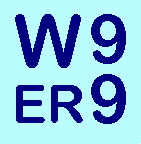
 |
II (Ibero-American) Workshop on Requirements Engineering |
| Buenos Aires, Argentina
9-10 September, 1999 |
| List of Accepted Papers
Requirements process and management (click on the title to retrieve a paper) |
| Requirement
engineering for enhancement projects
Rakesh Agarwal and Bhaskar Ghosh |
| Abstract. The requirements engineering activity concerns the elicitation, the modeling, the analysis, and the validation the customers' needs, is recognized as a crucial activity in the software lifecycle. The paper presents the practical experiences for describing and supporting discussions about requirements engineering. The process is divided into five steps. (a) Understanding the requirements (b) Identifying possible solutions (c) Studying the impact of possible solutions (d) Presenting and discussing them based on the impact study and (e) Choosing the most suitable solution.This paper is based on a project for which the requirement engineering was executed in one of the fortune 100 company in USA. For the sake of security we will not mention the name of the company. |
| O
impacto dos COTS no processo de engenharia de requisitos
Fabrízia Medeiros de Sousa, Fernanda Maria Ribeiro de Alencar e Jaelson Freire Brelaz de Castro |
| Resumo. Surge uma nova forma de desenvolvimento de software baseada no uso de software prontos, já existentes no mercado, chamados componentes COTS (Commercial Off-The-Shelf). O sucesso dessa nova metodologia de desenvolvimento tem sido demonstrado pelo uso crescente em importantes organizações, incluindo governo, indústria e comércio. Redução de custos e de prazos são os principais benefícios prometidos por esta nova tecnologia de desenvolvimento de software. Por outro lado, existem riscos associados ao novo processo. Nesse trabalho é apresentado o processo de desenvolvimento de software baseado em COTS e suas implicações na engenharia de requisitos. É feita uma análise das fases tradicionais do processo de engenharia de requisitos para adaptar as novas características de desenvolvimento introduzidas pelos componentes COTS. |
| An
object-oriented library for tracing requirements
Francisco A. C. Pinheiro |
| Abstract. We present the overall design of an object-oriented library for use when developing tracing capable applications. The library is implemented as java classes and consists of definitions of the basic classes for registration of objects and relations, as well as methods for different types of tracing procedures and components for manipulating tracing results and viewing them graphically. |
| Multiview++
Environment: Requirements Traceability from the perspective
of different stakeholders
Marco Toranzo and Jaelson Castro |
| Abstract. Traceability is recognized by many as an important prerequisite for developing high quality software. In a development project it is viewed as the problem of maintaining an information system that keeps relevant links between artifacts developed and delivered by the software development process. The main contribution of this paper is to provide a definition of requirements traceability, to discuss some of its implications, to present a new traceability model based on stakeholders views and to give an overview of a prototype tool under development. |
| Position papers
- multidisciplinary approach and education
(click on the title to retrieve a paper) |
| Can
artificial intelligence help during requirements engineering?
Armin Eberlein |
| Abstract. Having been neglected for many years, requirement engineering (RE) has recently experienced a drastic increase in interest. Nevertheless, it is still a very difficult task to manage requirements effectively, and companies still struggle with many requirements related issues. There is currently no comprehensive solution to requirements engineering available. One of the possible aids for requirements engineering could be artificial intelligence (AI). This paper therefore reviews several AI technologies and outlines some initial ideas how requirements engineering could potentially benefit from AI, hoping to increase discussion and research in this area. But there is no doubt that it is still a long way until mature techniques and intelligent tools will be available for requirements engineering. |
| Introduzindo
Engenharia de Requisitos no currículo de Engenharia Elétrica/Eletrônica:
o caso UFPE Fernanda Maria Ribeiro de Alencar e Jaelson Freire Brelaz de Castro |
| Resumo. Neste artigo descrevemos alguns dos problemas típicos de um egresso no curso superior em Engenharia Elétrica habilitação em Eletrônica e observamos como estão relacionados com a deficiência de formação na área de requisitos. Examinamos então as recentes diretrizes Curriculares para Cursos de Engenharia propostas pelo MEC, verificamos e propomos que a matéria Engenharia de Requisitos seja incluída na grade curricular dos cursos da área, para sanar estas deficiências. Ao final, apresentamos um relato de nossa experiência com a introdução do ensino de Engenharia de Requisitos no curso de Engenharia Elétrica/Eletrônica da Universidade Federal de Pernambuco. |
| Complete
List of Papers
Sections Requirements Negotiation and Elicitation Requirements Analysis Requirements modeling and representation Requirements process and management Position papers - multidisciplinary approach and education |
| [WER99] [Call for Papers] [Coordination] [Program Committee] [Workshop Program] |
| [Invited Speakers] [Industrial Track] [Educational Track] [Travel, Hotels and Tourism] |